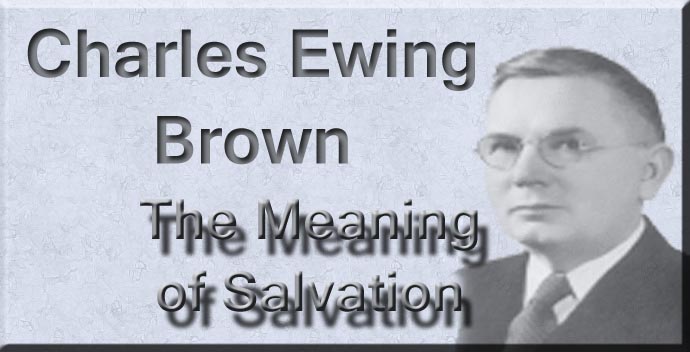
The Meaning of Salvation
By Charles Ewing Brown
Back Cover
|
We, too, being called by His will in Christ Jesus, are not justified by ourselves, nor by our own wisdom, or understanding, or godliness, or works which we have wrought in holiness of heart; but by that faith through which, from the beginning, Almighty God has justified all men; to whom be glory forever and ever. Amen. Clement of Rome (First Century) * * * * * * * As a burnished mirror, so ought man to have his soul pure. When there is rust on the mirror, it is not possible that a man's face be seen in the mirror; so also when there is sin in a man, such a man cannot behold God. Do you, therefore, show me yourself, whether you are an adulterer, or a fornicator, or a thief, or a robber, or a purloiner; whether you do not corrupt boys; whether you are not insolent, or a slanderer, or passionate, or envious, or proud, or supercilious; whether you are not a brawler, or covetous, or disobedient to parents; and whether you do not sell your children; for to those who do these things God is not manifest, unless they have first cleansed themselves from all impurity. All these things, then, involve you in darkness, as when a filmy defluxion on the eyes prevents one from beholding the light of the sun: thus also do iniquities, O man, involve you in darkness, so that you cannot see God. Theophilus, Bishop of Antioch (Second Century) * * * * * * * I offer unto thee, O Lord, all my sins and offenses, which I have committed before thee, and thy holy angels, from the day wherein I first could sin, to this hour, upon thy merciful altar, that thou mayest consume and burn them all with the fire of thy love, and wash out all the stains of my sins, and cleanse my conscience from all offenses, and restore to me again thy grace which I lost by sin, forgiving me all my offenses, and receiving me mercifully to the kiss of peace. Thomas a Kempis, in The Imitation of Christ (Fifteenth Century) * * * * * * * I am sure there is a common Spirit that plays within us, yet makes no part of us; and that is, the Spirit of God, the fire and scintillation of that noble and mighty Essence, which is the life and radical heat of Spirits, and those essences that know not the virtue of the Sun; a fire quite contrary to the fire of Hell. This is that gentle heat that brooded on the waters, and in six days hatched the World; this is that irradiation that dispels the mists of Hell, the clouds of horror, fear, sorrow, despair; and preserves the region of the mind in serenity. Whosoever feels not the warm gale and gentle ventilation of this Spirit, though I feel his pulse, I dare not say he lives: for truly, without this, to me there is no heat under the Tropics; nor any light, though I dwelt in the body of the Sun. Thomas Browne, in Religio Medici (Seventeenth Century) * * * * * * * Then were their fetters broken to pieces before their faces, and cast into the air, and their steps were enlarged under them. Then they fell at the feet of the Prince, kissed them, and wetted them with tears; they also cried out with a mighty strong voice, saying, "Blessed be the glory of the Lord from this place!" So they were bid rise up, and go to the town and tell Mansoul what the Prince had done. He commanded also, that one with pipe and taber should go and play before them all the way into the town of Mansoul. Then was fulfilled, what they never looked for, and they were made to possess what they never dreamed of. Bunyan's Holy War (Seventeenth Century) * * * * * * * To be converted, to be regenerated, to receive grace, to experience religion, to gain assurance, are so many phrases which denote the process.... by which a self hitherto divided, and consciously wrong, inferior, and unhappy, becomes unified and consciously right, superior, and happy in consequence of its firmer hold upon religious realities. William James, in The Varieties of Religious Experience (Twentieth Century) |
|
 |
 |
|
|
|
-
Site Navigation
 Home
Home What's New
What's New Bible
Bible Photos
Photos Hiking
Hiking E-Books
E-Books Genealogy
Genealogy Profile
Free Plug-ins You May Need
Profile
Free Plug-ins You May Need
 Get Java
Get Java.png) Get Flash
Get Flash Get 7-Zip
Get 7-Zip Get Acrobat Reader
Get Acrobat Reader Get TheWORD
Get TheWORD